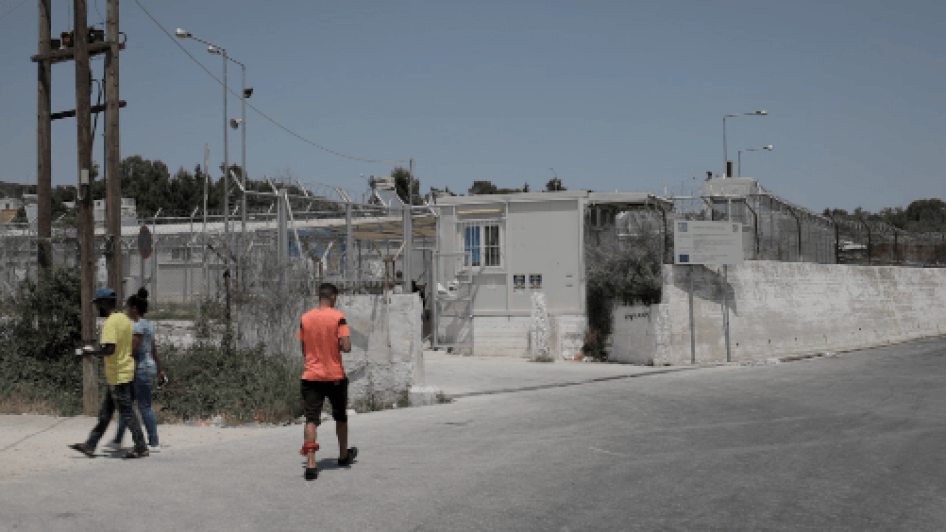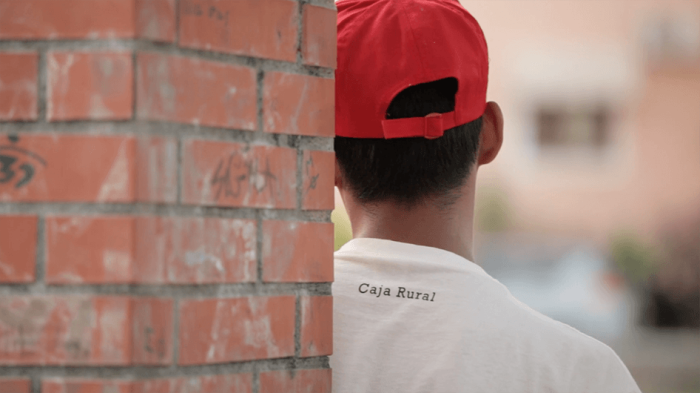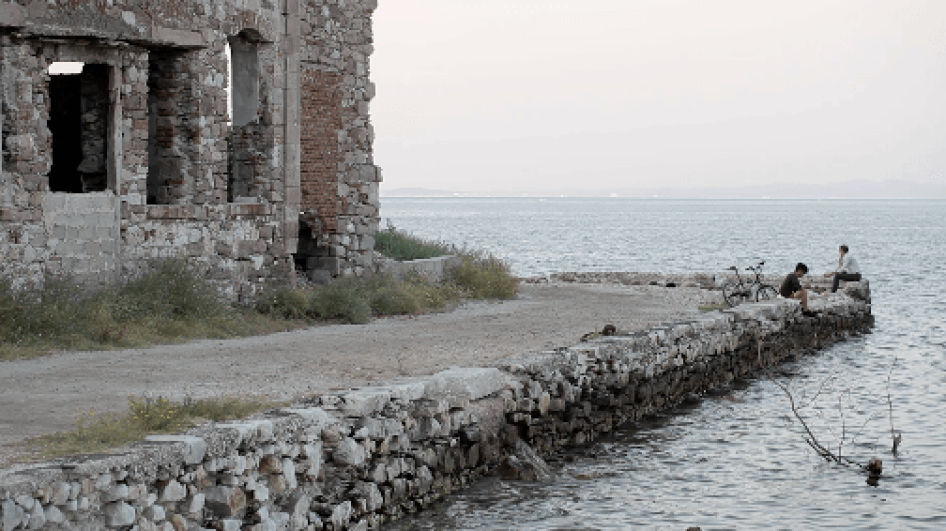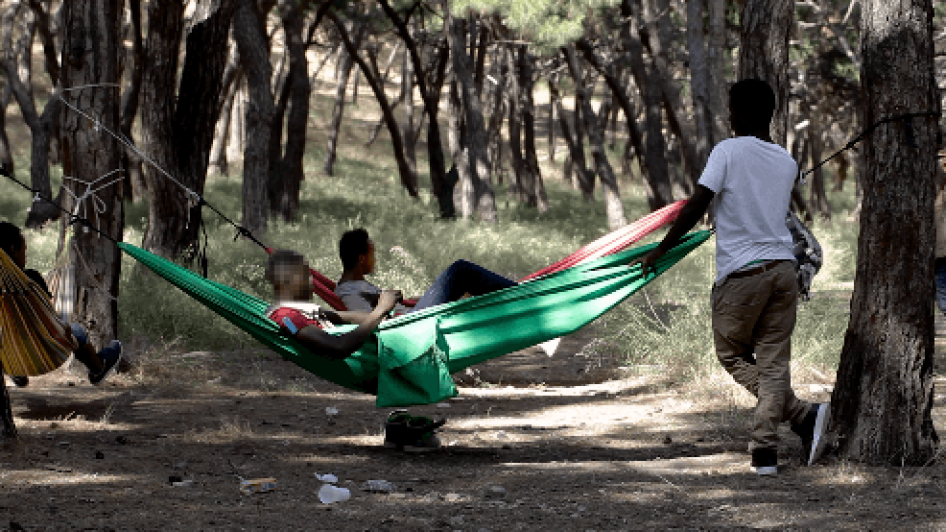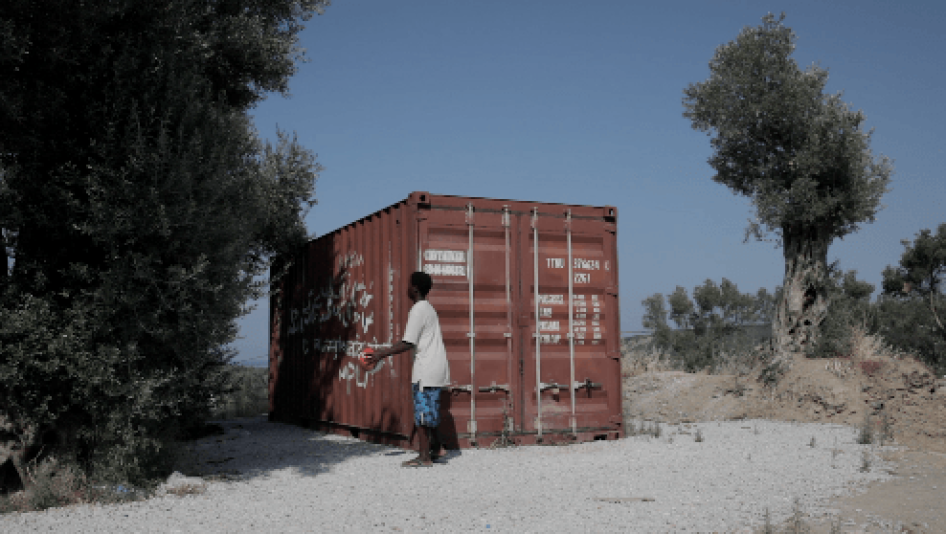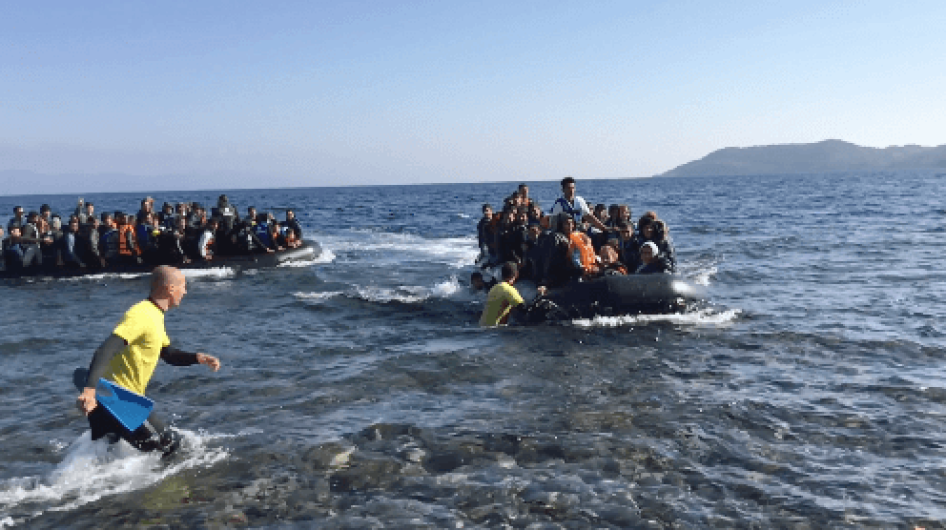(Athens) – Unaccompanied migrant children on the Greek island of Lesbos are being incorrectly identified as adults and housed with unrelated adults, leaving them vulnerable to abuse and unable to access the specific care they need, Human Rights Watch said today.
“The misidentification of unaccompanied migrant kids on Lesbos as adults leads to real problems, including lumping them together with unrelated adults and denying them the care they need,” said Eva Cossé, Greece researcher at Human Rights Watch. “Greek authorities need to take responsibility for properly identifying unaccompanied children and providing them the protection and care every child needs.”
On visits to Lesbos island from May 22 to 28 and June 27 to 30, 2017, Human Rights Watch spoke with 20 children, some as young as 15, who said they had been wrongly registered as adults by the Greek authorities.
Under Greek and international law, unaccompanied children are entitled to special care and protection. But the flawed age assessment procedures that are being followed in practice mean that some of these children are wrongly deemed adults during registration, despite an assurance by Greek officials to Human Rights Watch that a proper, multidiscipline procedure is followed. Other children claim to be adults, believing it will allow them to avoid detention or because they follow bad advice from adults, but then realize they have made a mistake and try to persuade the authorities to register them correctly. They can spend months trying to change their official status, and in the meantime often continue to be treated as adults, or reach adulthood, known as “aging out,” while waiting for their correct age to be assessed.
Human Rights Watch found that officials who register new arrivals sometimes arbitrarily record children’s ages as older than the children themselves give. Authorities also often require unaccompanied children to receive cursory dental examinations at the local hospital as a form of age assessment, following which authorities may insist the child is in fact an adult and register them as such. Human Rights Watch found this occurs despite a 2013 ministerial decision setting out a multidiscipline approach to age assessment, with medical examinations as an option of last resort and despite an assurance from Greece’s Reception and Identification Service (RIS), a Greek government agency, that the principle of the best interest of the child always prevails.
On the other hand, reception service officials do not usually question unaccompanied children who claim to be adults even when their appearance strongly suggests that they are well under 18. In practice, authorities fail to provide children with adequate information about their rights during the reception and identification process on the islands and take no steps to verify whether an individual claiming to be an adult is a child, creating a risk that trafficked children will not be identified and protected from further harm.
While registered unaccompanied children should be transferred to safe accommodation, Greece has a chronic shortage of space. Pending placement in a shelter, the authorities often detain unaccompanied migrant children in police stations, immigration detention facilities, and European Union-managed asylum processing centers. As of June 20, 1,149 unaccompanied migrant children were on the waiting list for shelter, including 296 detained in such facilities.
The problem has grown more acute since the arrival of more than 1 million people in the Greek islands in 2015 and 2016. Border closures in countries to the north have effectively trapped asylum seekers and migrants in Greece, and a deeply flawed EU deal with Turkey, signed in March 2016, has led Greece to restrict asylum seekers to the Greek islands with the aim of returning them to Turkey.
Nongovernmental organizations on Lesbos told Human Rights Watch they have identified at least 60 people registered as adults who claim to be children.
Children registered as adults are left to fend for themselves and are vulnerable to exploitation, trafficking, and other abuse. They live in official and unofficial sites with unrelated adult single men; are exposed to inhumane living conditions, including overcrowding, unsanitary conditions, and frequent incidents of violence; and are unable to go to school or otherwise access education. They have little or no access to care, protection, or specialized services, and are excluded from accommodation for unaccompanied children.
Once the Greek authorities register unaccompanied children as adults for whatever reason, it is difficult, if not impossible, for them to change their status. Even when nongovernmental groups identify children as wrongly registered as adults, it can take months to overcome the burdensome bureaucratic procedures to establish their real age and register them as children. The process of being recognized as children took so long in some cases Human Rights Watch examined that the children had turned 18 during the intervening period. This undermined their ability to reunite with family members in other EU countries or to get specialized housing or services for children.
Statements from these children about how they feel suggest the situation in which they find themselves in Greece is causing psychological harm and exacerbates existing mental health conditions, Human Rights Watch said. All the children interviewed reported experiencing psychological distress, including symptoms such as anxiety, depression, headaches, insomnia, and loss of appetite. Two children reported harming themselves.
Authorities in Greece should urgently improve the quality of their age assessment procedures, bringing them into line with international best practices, Human Rights Watch said. Greek authorities should take steps to identify children, give children whose age is disputed the benefit of the doubt in close cases, and ensure that unaccompanied children have access to decent accommodation where they can receive care, education, counseling, legal aid, guardianship, and other essential services. Those who are determined to be over 18 should be accommodated in special housing for young adults and given access to adequate services, including psychosocial support and mental health services.
The European Commission and the European Asylum Support Office should make use of their presence on the islands to ensure that the Greek authorities’ age assessment methods and procedures fully comply with the legal safeguards provided by Greek and EU law, and that children are given the benefit of the doubt where results are inconclusive. The EU emergency relocation mechanism should also be urgently extended to unaccompanied children identified on the Greek islands, irrespective of nationality, and EU member states should accelerate relocation of unaccompanied migrant children.
“Vulnerable kids in Greece who have endured dangerous journeys far from their families should not have to fight for months just to prove they are children,” Cossé said. “Greece should do a better job identifying these children so they get the care they need and deserve.”
Registering Unaccompanied Migrant Children
Greek authorities formally registered over 1,800 unaccompanied asylum-seeking and migrant children arriving in Greece in the first five months of 2017. Many of them are from Syria, Afghanistan, and Iraq, countries beset by armed conflict and serious human rights abuses. Some of the others, such as children from Pakistan, were escaping discrimination and poverty.
Greek legislation recognizes the government’s obligations to care for and protect unaccompanied migrant children. Under Greek law the government is supposed to appoint a guardian for each child to represent them in any legal or judicial proceeding, to hear the child’s views prior to any decision-making, and to act in their best interests. But Human Rights Watch found that authorities in Lesbos often register unaccompanied migrant children as adults. Invisible as children, and outside of care arrangements, these children are particularly vulnerable to violence, exploitation, and abuse.
The Greek Reception and Identification Service (RIS) is required to provide for the reception of third-country nationals entering the islands under conditions that guarantee human rights and dignity in accordance with international standards. New arrivals are brought to EU-managed asylum processing centers on the Greek islands, the so-called hotspots, for identification and registration.
The RIS is responsible for identifying and registering people who belong to “vulnerable” groups upon their arrival, which should include unaccompanied migrant children. The agency is supported in doing this by the Greek police; EU agencies, such as the border agency Frontex; UNHCR, the United Nations refugee agency; the International Organization for Migration; and medical nongovernmental organizations. RIS is responsible for referring unaccompanied migrant children to social services and providing them with information on their rights, including their right to seek asylum. In a July 10 letter to Human Rights Watch, RIS said that particular attention is given to the procedures for unaccompanied children who “receive specific information adapted to their age or maturity about their legal status and the procedural possibilities offered at subsequent phases of the process.” In practice on Lesbos, though, Human Rights Watch found that RIS is failing to meet its responsibilities toward these children.
“Zahid,” a boy from Pakistan who said he was 16 when he arrived on Lesbos in March 2016, described the inadequate procedure during his first encounter with the authorities:
When I arrived, I was 16 but they [authorities] wrote on the papers 19. They didn’t even take me to the doctor. …. They asked me my name, my age, and then they took my fingerprints…. I told them I was 16. They separated me from the other people and took me where the unaccompanied children are [a restricted section for unaccompanied children inside the Moria hotspot]. They kept me there for 10 or 15 days and then they took me out again. They never explained to me why, they just took me out. Then I stayed with other people, outside [the children’s section]…. I don't know why they changed my age. I asked them many times and the only thing they told me is to sign some papers.
Fifteen months after his arrival, Zahid, today 17, was still being treated as an adult by the authorities and his real age hadn’t been formally recognized.
Children Who Claim to be Adults
Human Rights Watch spoke with six children in Lesbos who said they falsely claimed to be adults when they arrived in Greece. They did so, they said, because they feared detention or because they heard false information from smugglers or other migrants that registration as a child would lead to worse outcomes, such as separation from friends and distant family. When they realized the unpleasant consequences of being registered as an adult or because, finally, they were correctly advised, they said they told officials that they wanted to change their age to the correct one, but faced many obstacles.
“Hassan,” a boy from Afghanistan, said he was 15 when he arrived in June 2016:
Before doing my registration, several Afghans told me ‘don’t give your real age because they are going to keep you in the children’s section.’ … They [the authorities] told me ‘you look underage, if you have papers show them to us.’ I said I don’t have any papers and because the others had told me to not say I’m a minor, I said I’m an adult.
He said it took two other unrelated adults traveling with him to say he is an adult to convince the authorities. The inadequacy of identification procedures means that there is a serious risk that trafficked children are not recognized as such.
Hassan, who is now 16, lived for more than eight months with the general population of the Moria camp, mainly unrelated adult single men. At the time of our interview, in May, he had been living for two months in a protected area within the Moria hotspot that accommodates young men between the ages of 18 to 22 and some of those whose ages are disputed, run by the RIS. He said his age had been formally recognized by the Greek Asylum Service (GAS), in the context of the asylum process, but was still pending recognition by the RIS.
“[RIS told me] ‘You are a guest in our space and we are not responsible for you anymore.’ I just wanted to know what will happen to me and whether I’ll be transferred to a house [for unaccompanied children] and go to school.”
According to nongovernmental groups and children interviewed, when detention measures for unaccompanied children were relaxed on the island of Lesbos at the end of 2016, and children were allowed to go in and out of the section for unaccompanied migrant children, many children who had initially given a false age and registered as adults because of fear of detention said they changed their minds, wanting to register their real age. Others sought to do so when they received proper information from nongovernmental groups, which instructed them to tell the truth.
Inadequate Age Assessment
When authorities are in doubt as to whether a person is a child, Greek law requires that they must first give that person the benefit of the doubt, operating on a presumption of childhood, and second, perform a comprehensive age determination.
UNHCR and the UN Committee on the Rights of the Child have instructed countries not to base age determinations solely on the child’s physical appearance or on a single medical test, but also to consider psychological maturity and the margin of error of medical exams (which can be up to five years), and to give the benefit of doubt in making a determination. In ethical terms, such exams offer no medical benefit and the margin of error is so broad that the exams can’t establish what they are intended to do.
Best practices in age determination require a multidisciplinary approach. Any medical testing should be non-intrusive. X-rays for age determination are increasingly regarded as a violation of medical ethics because they expose children to radiological testing for no medical reason.
While an age determination process is ongoing, the person should not be detained or otherwise accommodated with unrelated adults.
As of October 2013, a decision by the health minister (MD 92490/2013) established for the first time an age assessment procedure applicable within the context of what was then called the First Reception Service, now the RIS.
The ministerial decision says that in cases in which there is justifiable doubt about the age of a third-country national, and the person may possibly be a child, they are to be referred to the RIS medical control and psychosocial support team for an age assessment. Initially, the age assessment will be based on physical appearance, such as height, weight, body mass index, voice, and hair growth, following a clinical examination by a pediatrician. In case the person’s age cannot be adequately determined, the psychologist and the social worker will assess the person’s cognitive, behavioral, and psychological development.
If a pediatrician is not available or the interdisciplinary staff cannot reach any firm conclusions – and only as a measure of last resort, the decision says – the person shall be referred to a public hospital for specialized medical examinations, such as dental or wrist X-rays. Staff there are to explain clearly their aims and the procedures to the person being examined.
In a July 10 letter to Human Rights Watch, RIS said that, “In any case, the principle of the child’s best interests, equal treatment, and proportionality must prevail. During the age assessment procedure as well as in case of doubts after its completion, the minority presumption prevails.”
Human Rights Watch found that the age assessment procedure provided in Greek law is not followed in practice on Lesbos. All 14 people interviewed who told the authorities they were under 18 when they arrived said they were registered as adults following a cursory age assessment, which in most cases consisted of a visit to the local hospital and a quick examination of their teeth. None of the children who had gone through this medical examination had first, or indeed ever, been interviewed by a psychologist or a social worker for an age assessment. Even though the procedure provided in Greek law had not been followed, RIS registered them as adults.
“Akash,” who is from Bangladesh and said he turned 18 in March, arrived on Lesbos in the summer of 2016, when he was 17. He said the authorities registered him as 18 following a quick visit to the hospital. “In the beginning, they wrote I was 17 but then they took me to the doctor and wrote down 18.” He said:
When they took me to the doctor, the doctor examined my teeth in order to define my age. But I don’t understand. There are people who have their wisdom teeth at the age of 17, others at the age of 18 and others at the age of 22. The doctor just examined my teeth. They changed my age [to 18] and took me out [of the children’s section].
Akash said he lived for more than four months with the general population of the camp before being transferred to a protected area inside Moria run by the RIS for people between the ages of 18-22. In early June 2017, he was transferred again outside, with the general population, due to lack of space. His real age was never formally recognized. “I tried as much as I could, but they [authorities] never accepted my age,” he said.
Contesting Designation as an Adult
Once children are registered as adults, either following a cursory age assessment procedure, or because they initially claimed they were adults, it is difficult if not impossible for them to change their status to that of a child.
Under Greek law, after a RIS age assessment procedure is completed, the person should be informed in a language they understand about the reasons for the decision. They have a right to appeal within 10 days, but RIS requires anyone who files an appeal to provide an original ID or original passport proving their age, which should be officially translated or verified, within this period.
All children interviewed said they faced practical difficulties in getting identification documents proving their age within the 10-day period. Human Rights Watch found that all appeals brought by children interviewed, were rejected by RIS. In rejecting the appeals, RIS disregarded the proven and objective difficulties for children to verify or officially translate the documents or to get legal assistance.
Some children said they had no parents or relatives in their home countries to provide the documents, and others had refugee profiles that could put them at risk if they contacted their embassies or relatives in their home countries.
For most, their only chance to seek to establish their age was at a later stage, during the asylum interview, conducted either by Greek Asylum Service (GAS) staff or officers of the European Asylum Support Office (EASO). Greek law sets out guarantees for children in that procedure, including the appointment of a guardian to protect the child’s rights and best interests throughout the age determination procedure, and the guarantee that a person who claims to be a child should be treated as such until the completion of the age determination procedure. The law also explicitly provides the applicant with the benefit of the doubt even after the conclusion of the procedure if the person’s age has not definitively been determined.
Human Rights Watch found that when it comes to children who have been wrongly registered as adults by RIS, the asylum service does not deviate from RIS findings unless explicit proof is provided. In a July 12 letter to Human Rights Watch, the asylum service confirmed that it cannot change data recorded by RIS and the police during initial registration “unless the applicant produces compelling evidence (e.g. an original passport not presented to RIS or the police) to the contrary.” The procedure before the asylum service can last for months, and while it is ongoing, children interviewed by Human Rights Watch were treated as adults.
“Anush,” a boy from Afghanistan who said he initially registered as an adult in August 2016, tried to get his real age – 16 – recognized during his asylum interview in February 2017:
Because I told them I am a child, they didn’t ask me many questions. Basically, they asked me why I came from Turkey and didn’t stay there…. The interview lasted for an hour. They asked ‘Why didn’t you stay in Turkey? Why you didn’t go to UNHCR offices and register there?’ I told them that when I was in Turkey, a guy [smuggler] had me as some kind of a prisoner and also because I am under age I couldn’t have access to school or go to the hospital.
A worker with a nongovernmental group supporting “Anush” with his case said:
He provided his original birth certificate more than two-and-a-half months ago. We went to EASO, provided it, and registered him as a minor. The document was checked by Frontex as to whether it’s original. After waiting for more than two months, Anush goes to renew his asylum card and is given an appointment for a second interview, as an adult…. We go again today, and the EASO officer says in front of Anush, and the lawyer, that we need to do a new registration and that they had forgotten we already submitted the papers. Today, Anush lost completely his trust in the system and us.
At the time of our interview, in May, Anush was living with the adult population of the Moria camp and his real age hadn’t been formally recognized yet.
In a July 12 letter to Human Rights Watch, the asylum service said that if it appears that the asylum seeker is a child traveling alone, its officers are instructed to treat the case as such. The officer is obliged to notify the public prosecutor, who will act as the temporary guardian, and the National Center for Social Solidarity. In more general terms, the asylum service said that its officers are instructed to conduct the asylum interview always bearing in mind the best interest of the child.
Children at Risk
Unaccompanied children are some of the most vulnerable migrants in the world; international and European human rights law, as well as EU law, recognizes that vulnerability, and obliges countries to provide unaccompanied children with care. International law stipulates that the child’s best interest is a primary consideration in any decision affecting the child and that children deprived of their family environment are entitled to special protection and assistance by the state.
The failure to carry out proper age and vulnerability assessments means that many children are not recognized as children. Most find themselves without appropriate accommodation and therefore sleep in conditions that are overcrowded, unhygienic, and a risk to their physical health and mental well-being. They stay in open spaces on the Greek islands in official and unofficial sites, share tents or container housing with adult strangers, and are exposed to frequent incidents of violence. They are unable to go to school or otherwise access education.
On an ad-hoc basis, and depending on capacity, authorities on Lesbos place people who are seeking to prove they are under 18 in protected areas within the Moria hotspot. Some of the children interviewed were accommodated there at the time of the interview. But increased arrivals and overcrowding have resulted in transfers of these children to places outside of the protected areas. Others have been living in the open space with unrelated adult single men since their arrival.
There are no reliable estimates of the number of children who may be registered as adults but who haven’t been identified by nongovernmental groups or others or otherwise made themselves known to the authorities and are not receiving the special protection and care to which they are entitled under Greek and international law.
Anthi Karangeli, the director of RIS, confirmed that the lack of dedicated space on the island for age-disputed cases is problematic. “We can provide them with special treatment to the extent that space allows us,” she said.
“Samil,” from Afghanistan, said he was 14 when he arrived in Lesbos. He said he spent more than nine months living with the general population in the camp. At the time of the interview in May, it had been a month since he had been transferred, along with his 19-year-old brother, to the section for unaccompanied children inside Moria. He said his real age was formally recognized by the asylum service at the end of April:
I spent nine months in the tent…and now I’ve been one month here [section for unaccompanied children]…. When we were living in the tent [with adults], every day we were living in fear because of the many fights. Intense fear. I’ve been injured on my shoulder during a fight. Our tent was in the middle and it had been broken and burned twice…. I’ve reached a point where I harmed myself three times.
Recommendations
The Greek government should:
- Ensure that there are sufficient and suitable alternatives to detention and end the unjustified detention of unaccompanied children, which deters children from registering as such;
- Establish suitable separate reception facilities for young adults and age-disputed cases on the Greek islands and mainland Greece, and in the meantime, ensure that there are adequate and protected places in existing facilities;
- Train RIS officers conducting initial screening and other officials, including Frontex, the European Asylum Support Office staff, and Greek Asylum Service officers, to correctly identify unaccompanied children, trafficking victims, and children with special protection needs, and to refer them to services as warranted;
- Ensure that qualified interpreters assist unaccompanied migrant children;
- Provide unaccompanied children who are illiterate with verbal and age-appropriate information about their rights and entitlements in Greece as children;
- Ensure that all age determination procedures use a multidisciplinary approach that does not rely solely on appearance or medical or dental examinations. In the limited instances in which medical tests are carried out, use non-intrusive and non-invasive examinations to the extent possible;
- In the case of uncertainty, give children whose age is disputed the benefit of the doubt and treat them as children;
- Treat those with age assessment pending cases before the Greek Asylum Service as children, until their case has been finally resolved;
- Re-examine cases of anyone assessed as an adult following inadequate and summary age determination procedures and until then, treat them as children;
- Reform Greek law to ensure that anyone contesting designation as an adult has reasonable and adequate time to provide identification documents proving their age;
- Provide free legal assistance for unaccompanied children, including those who claim to be under 18, in all administrative and judicial proceedings;
Expedite reunification processes for older children and, on an equitable basis, work with other EU member states to effect reunification in cases where the state’s delay has meant that children reach 18 during the process.
